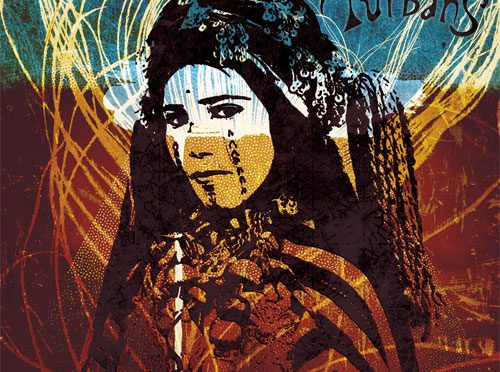The Turbans – The Turbans (Six Degrees, 2018)
I can’t help from getting a little thrill from a band that sounds like they trekked off into the wilderness or down to the crossroads for a bit of inspiration and returned with something wholly different. That seems to be what U.K.-based band The Turbans did, except they actually retreated to a farmhouse in Northumberland. Dipping into fingers into gypsy, Balkan, flamenco, Middle Eastern and Mediterranean musical traditions, The Turbans have conjured up a sound that their Kurdish percussionist Cabbar Baba has rightly called “music from manywhere,” with band members rooted in the music of Turkey, Bulgaria, Israel, Iran, Greece, Spain and England. Their self-titled debut recording The Turbans will be available today, April 6th on the Six Degrees Records label.
The band’s Oshan Mahony recalls, “For this album we all went together to the farmhouse where I grew up in Northumberland. We all contributed about thirty songs. Some were traditional sounding, others were poppy. When ou have a classical violinist playing an Indian raga you create something really weird and new.”
And, nothing could be further than the truth on The Turbans. Possessed by a kind of feral grace and a sleek savageness, The Turbans weave a sound that is intricately explosive and hypnotically delicious so that dervishes or a raucous gypsy band might approach with more than a little trepidation. The sound is wholly global where strange and familiar coexist.
Comprised of violinist Darius Luke Thompson; percussionist and vocalist Cabbar Baba; oud player Maxim Shchedrovitzki; davul player and vocalist Pavlos Mavromantakis; electric guitarist and vocalist Miroslav Morski; bass guitarist, trombonist and backing vocalist Fred Stitz; electric guitarist Moshe Zehavi; cajon player and classical guitarist Pablo Dominguez; ney, kaval and clarinet player Kansia Pritchard; saxophone and bansuri player Madhav Haridas and Oshan Mahony, The Turbans packs a punch with additional musicians and backing vocals so the sound is rich and full. It doesn’t hurt that the group snagged master mixer Jerry Boys who has worked with the likes of Buena Vista Social Club, Ali Farka Toure, Shakira, Toumani Diabate and the Kronos Quartet, as well as World Circuit’s Tom Leader to master The Turbans.
The real cleverness of The Turbans is that the group allows one genre flows easily against another creating an kind of improvisational feel where tracks flow without sounding over polished. Opening track “Riders” is ripe with Middle Eastern influences and a joyful exuberance, while tracks like “Sinko Moy” delve into a subterranean mysteriousness. “Zawi” is all whirlwind goodness with some kickass guitar lines thrown in for good measure as is the lanky lines of “Samia.” “Kansianitsa” is rich with woodwinds and percussion, while “Aman” is all flamenco lushness. There are also goodies like “Hamouda” with its call-and-response vocals and guembri in this nod to the Gnawan and the lushly worked “Chubby” with its Chaabi influences. There’s also the raucously infectious brass laced “Madhavski Horo,” the sultry ney of “Ruuah” and carnival feel goodness of closing track “Hackney.”
Mr. Mahony says of the group’s dynamic, “Every single person in this band has such a strong fire inside them. I know so many good musician in this city, and even around the world, who play perfectly, but when they play they don’t release the passion of the music. Everyone in this band has so much fire.”
Thankfully we can hear and feel the fire of “manywhere” from here.
Buy The Turbans
Author: TJ Nelson
TJ Nelson is a regular CD reviewer and editor at World Music Central. She is also a fiction writer. Check out her latest book, Chasing Athena’s Shadow.
Set in Pineboro, North Carolina, Chasing Athena’s Shadow follows the adventures of Grace, an adult literacy teacher, as she seeks to solve a long forgotten family mystery. Her charmingly dysfunctional family is of little help in her quest. Along with her best friends, an attractive Mexican teacher and an amiable gay chef, Grace must find the one fading memory that holds the key to why Grace’s great-grandmother, Athena, shot her husband on the courthouse steps in 1931.
Traversing the line between the Old South and New South, Grace will have to dig into the past to uncover Athena’s true crime.


